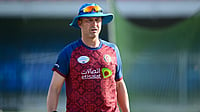The reality of police work is not always good, says "Delhi Crime 2" director Tanuj Chopra who wanted to communicate concerns of police brutality and stereotyping along with the dilemmas of a force tasked with unravelling a series of brutal murders.
While the first season of "Delhi Crime" looked at the Nirbhaya gangrape and murder, the second details the investigation into a spate of robberies and murders of the elderly.
Responding to a question on whether real life events around police brutality and racism informed the depiction of cops introspecting as they investigated, Chopra said yes.
"It was a conscious decision to do so... There is a certain protocol to find who is behind the crime," Chopra told PTI.
"Communities are raided, lots of people are rounded up and it's just the way procedure works in terms of finding the criminals. There has been a lot of conversation about these techniques, methodologies and it's a big question around the world actually," he added.
The second season of "Delhi Crime" is inspired by a chapter from the book "Khaki Files", penned by former Delhi Police chief Neeraj Kumar, about a string of serial killings that shook the city in the early 1990s. The show, which focuses on a denotified tribe (DNT) viewed as criminal and the notorious 'kachcha-baniyan gang', has adapted and contemporised the narrative.
"Delhi Crime 2", fronted by Shefali Shah who returns as DCP Vartika Chaturvedi, is getting mostly positive views for its reflective gaze into the functioning of police departments.
"In season one of 'Delhi Crime', the cops were always seen in a very good light towards finishing the case. But the reality of police work is not always good. It's good and bad. Police have to do things that might or might not be questionable publicly. We wanted Vartika to look inwards. It was a way to make the show grow and find more complexity," the filmmaker added.
According to Chopra, the police "looks good" if shown analysing their approach.
"All companies, institutions do it. They have to look inwards and reflect. Despite making some wrong moves, they are still going after the killer.
"The process of catching a killer is messy at times. But life is messy and I think the show needs to reflect that a little bit. Crime fiction also demands that you have to make something watchable. It's a show, it's something for people to enjoy."
Chopra, also known for his 2006 feature debut "Punching at the Sun", said he was "sensitive" about the research on "Delhi Crime".
"We investigated from all sides. We talked to the people from the police, victims of the crime and people from the DNTs. We fielded a lot of perspectives because the crime itself is brutal but there's a reason behind it too. And that's important to understand where these crimes came from in the first place. I was sensitive to that."
The biggest win for the show was the involvement of the people from the DNTs who came in and played those parts on screen, he added.
"I spoke with them for a long time asking about how their portrayal on screen has been historically, how they feel about the work that has come out. They have a lot of theatre groups and workshops. They put on plays, write their stories."
Chopra's background as an independent filmmaker helped him take over the directorial duties of "Delhi Crime 2".
The US-born director, whose credits include documentary shorts such as "WCI: Project Heart" (2013) and "Vijay Iyer & the Sextet" (2012), said the Netflix police procedural drama has the aesthetics of a documentary.
"Delhi Crime 1" was directed by Richie Mehta. He is credited as creator on the second chapter, which is helmed and showrun by Chopra.
Mehta had put in four years for the first season, which premiered in 2019, and he was "pretty exhausted" by the end of the process. He stepped down as he had other things to do, added Chopra.
"When he stepped down, they were looking for other directors to take over. Richie had started developing some ideas for this case but he couldn't complete it. So I was coming in when the material was already in motion.
"They were looking for a person who could run the show, direct it and bring the filmmaker's sensibility to the material. 'Delhi Crime' is such a filmmaker's show... A lot of my work is in the same style. So it felt like a natural fit," he said.
"Delhi Crime 1" won an International Emmy for best drama series, the first Indian show to bag the recognition.
"I didn't feel the pressure at all. We have the best actors in India like Shefali Shah, Rajesh Tailang. Most of the shows don't get to have another season, they get cancelled. The fact is that it's going to have another season, the pressure should make the show good," he added.
Chopra, who divides his time between New Delhi, Mumbai and New York, said it took the cast and crew "a couple of years" to complete work on "Delhi Crime 2".
"The pandemic broke out while we were shooting, so that threw everything for a toss. Holding it together over the time has been more of an issue. But the writing was an organic process."
The second season of "Delhi Crime", which dropped on Netflix last week, also stars Rasika Dugal, Anurag Arora, Gopal Datt, Adil Hussain, Yashaswini Dayama, Denzil Smith and Tillotama Shome.


























